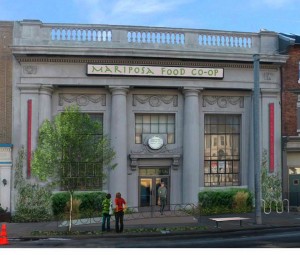Mariposa Food Co-op Kicks Off New Store Construction with Groundbreaking Ceremony June 27th 3pm

June 27, 2011 – Philadelphia, PA. Today at 3:00 PM, Mariposa Food Co-op celebrates the start of construction on its new grocery store with a groundbreaking ceremony at the new store site: the landmark Belmont Trust Building at 4824 Baltimore Avenue in West Philadelphia. Philadelphia Mayor Michael Nutter, representatives of the project’s major supporters, and other honored guests will join the co-op’s membership for the event, which is open to the public.
“When Mariposa opens its doors in October, our community-owned institution will dramatically improve access to healthy food in the neighborhood,” said Peter Collopy, Convener of Mariposa’s Board of Delegates.
The new store, five times the size of the current space, will offer an expanded selection of locally-produced, organic, and conventional products. Anyone will be able to shop at the new Mariposa Food Co-op, though members will receive a discount.
“We couldn’t do it without the dedication of our members and institutional partners, so today is about celebrating and thanking them,” continued Collopy.
Almost a quarter of the $2.3 million raised for the project to date has come from co-op members and other individuals. Other major funders include The Reinvestment Fund, Philadelphia Industrial Development Corporation, the Pennsylvania Department of Community and Economic Development, Northcountry Cooperative Development Fund and The Merchants Fund.
“The Mariposa Food Co-op expansion is a great example of state government partnering with local government and local development organizations,” said DCED Secretary C. Alan Walker.
Mariposa’s expansion means a significant transformation for the organization, but also deeper contributions to the local and regional economy. With considerably more space and more customers Mariposa will be able to expand its product lines and buying power, further supporting regional farmers and distributors of healthy and sustainable foods.

“The Reinvestment Fund is committed to supporting healthy food retailers that build local food systems and improve access to fresh foods for poor and working families,” said Patricia L. Smith, Senior Policy Advisor at TRF. “We are especially proud to support projects like Mariposa Food Co-op that promote fresh foods that are locally grown in a sustainable, responsible way, contributing to the economic and social well-being of this region as a whole.”
The groundbreaking ceremony will commence a $1 million eco-renovation, contributing to beautification and economic development on a recovering commercial corridor. In addition to the construction jobs created by the project, the new store will create eight to ten permanent jobs. Because Mariposa Food Co-op is owned and operated by its members, profits will stay in the neighborhood.
“The expansion of Mariposa Food Co-op is an outstanding example of neighborhood economic development that is vital to the well-being of our local communities,” said PIDC President Peter Longstreth.
The groundbreaking ceremony and reception is open to the public. Food and refreshments will be served.




